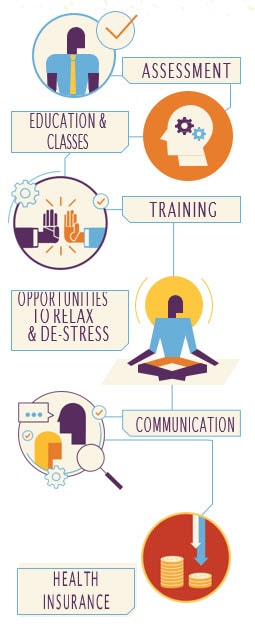Table of ContentsWhat Does What Is A Mental Health Day Mean?The Definitive Guide to What Kind Of Mental Health Professional Do I NeedNot known Incorrect Statements About How To Have Good Mental Health
You can ask your physician about this. There might be an expert mental health service that specifically handles your condition. However it might be under an NHS trust not funded by your CCG. You would require to see your GP and they would need to help you to use to your local CCG for financing. The BC Partners are made up of the following 7 mental health and compound use companies in BC. They use info, resources and connection to neighborhood resources across the province. Visit www.anxietybc.com or call 604-525-7566 - mental health diagnosis for child who halucinates. Visit www.bcss.org or call 1-888-888-0029 (toll-free in BC) or 604-270-7841 (in Greater Vancouver). See www.cmha.bc.ca or call 1-800-555-8222 (toll-free in BC) or 604-688-3234 (in Greater Vancouver). Visit www.carbc.ca (for referrals, contact the Alcohol and Drug Recommendation Service at 1-800-663-1441 (toll-free in BC) or 604-660-9382 (in Greater Vancouver). See www.forcesociety.com or call 604-878-3400 (in Greater Vancouver). Check out www.familyservices.bc.ca or call 1-888-988-5281 (toll-free in BC) or 604-988-5281 ext 204 (in Greater Vancouver).
Go to www.mdabc.net or call 604-873-0103. Support groups are an essential way to find support and information. They might help you feel less alone and more linked, even if you have not informed many others about your medical diagnosis. You can discover support groups in your neighborhood through psychological health organizations in your neighborhood, like those noted above.
For more on choosing the ideal support group for you, see the info sheet, "Choosing the Support System that's Right for You" at www.heretohelp.bc.ca. This the very first module in a three-part series. The other two modules are Working with http://fernandocidk316.huicopper.com/the-smart-trick-of-how-does-nicptine-affect-your-mental-health-that-nobody-is-discussing your Medical professional for Mental illnesses and Preventing Regression of Mental illnesses.

Psychological health refers to your psychological and mental well-being. Having good mental health helps you lead a reasonably delighted and healthy life. It helps you demonstrate durability and the ability to cope in the face of life's difficulties. Your psychological health can be affected by a variety of elements, consisting of life events and even your genes.
Why Can't I Cry Anymore Mental Health for Beginners
These can consist of: keeping a positive attitudestaying physically activehelping other peoplegetting enough sleepeating a healthy dietasking for professional help with your psychological health if you need itsocializing with individuals whom you enjoy investing time withforming and utilizing efficient coping skills to handle your problemsA mental disorder is a broad term which includes a broad variety of conditions which impact the method you feel and believe. mental health diagnosis for child who halucinates.
Psychological diseases can be affected by a number of different aspects, including: geneticsenvironmentdaily habitsbiologyMental health issues are common in the United States. About one in five American adults experience at least one mental illness each year. And around one in five youths ages 13 to 18 experience a mental disorder at some time in their lives, too.
About one in 25 grownups experience a major mental disorder (SMI) each year. A SMI can considerably decrease your ability to perform life. Various groups of individuals experience SMIs at different rates. According to the National Institute of Mental Health, females are more most likely to experience SMI than men.
Individuals with a mixed-race background are likewise more likely to experience an SMI than people of other ethnicities. The Diagnostic and Statistical Manual of Psychological Conditions, Fifth Edition (DSM-5) helps mental health professionals detect mental disorders. There are numerous kinds of psychological health conditions. In fact, nearly 300 different conditions are noted in DSM-5. These are some of the most common mental disorders affecting people in the United States:Bipolar illness is a chronic mental health problem that affects about 2.6 percent of Americans each year.
The Ultimate Guide To How To Bill Medicaid For Mental Health Services
These can affect an individual's energy level and capability to believe fairly. State of mind swings brought on by bipolar illness are far more severe than the small ups and downs the majority of people experience on an everyday basis.Persistent depressive condition is a persistent type of anxiety. It is likewise called dysthymia. While dysthymic anxiety isn't intense, it can hinder life.
About 1.5 percent of American adults experience dysthymia each year.Generalized stress and anxiety condition( GAD )surpasses routine everyday stress and anxiety, like fidgeting prior to a discussion. It triggers an individual to end up being incredibly concerned about many things, even when there's little or no factor to fret. Those with GAD might feel really nervous about getting through the day. In some cases stressing can keep individuals with GAD from achieving everyday jobs and chores. GAD affects about 3 percent of Americans every year.Major depressive disorder( MDD )triggers feelings of extreme sadness or hopelessness that lasts for at least 2 weeks. This condition is likewise called also called depression. Individuals with MDD may end up being so upset about their lives that they think of or try to dedicate suicide. These ideas occur with unneeded and unreasonable desires to perform certain habits, or compulsions. Lots of people with OCD recognize that their thoughts and actions are unreasonable, yet they can not stop them. More than 2 percent of Americans are detected with OCD at some time in their lifetime.Post-traumatic stress disorder (PTSD) is a mental disorder that's activated after experiencing or seeing a distressing event. Symptoms of PTSD may consist of flashbacks or being quickly stunned. It's approximated that 3.5 percent of American adults experience PTSD.Schizophrenia impairs a person's understanding of truth and the world around them. It hinders their connection to other individuals . It's a severe condition that requires treatment.They might experience hallucinations, have misconceptions, and hear voices. It's estimated that 1 percent of the American population experiences schizophrenia.Social stress and anxiety condition, in some cases called social phobia, triggers a severe fear of social circumstances.
Individuals with social anxiety might end up being really nervous about being around other individuals.They may feel like they're being judged. This can make it difficult to meet new people and attend social events. The signs of lots of psychological diseases might become worse if they're left untreated. Reach out for mental aid if you or somebody you understand may have a mental disease (mental health diagnosis for child who halucinates). If you're not sure where to begin, visit your.

medical care medical professional. They can assist with the preliminary medical diagnosis and provide a recommendation to a psychiatrist.